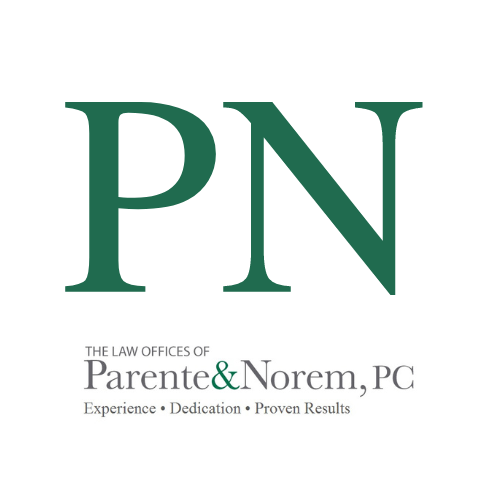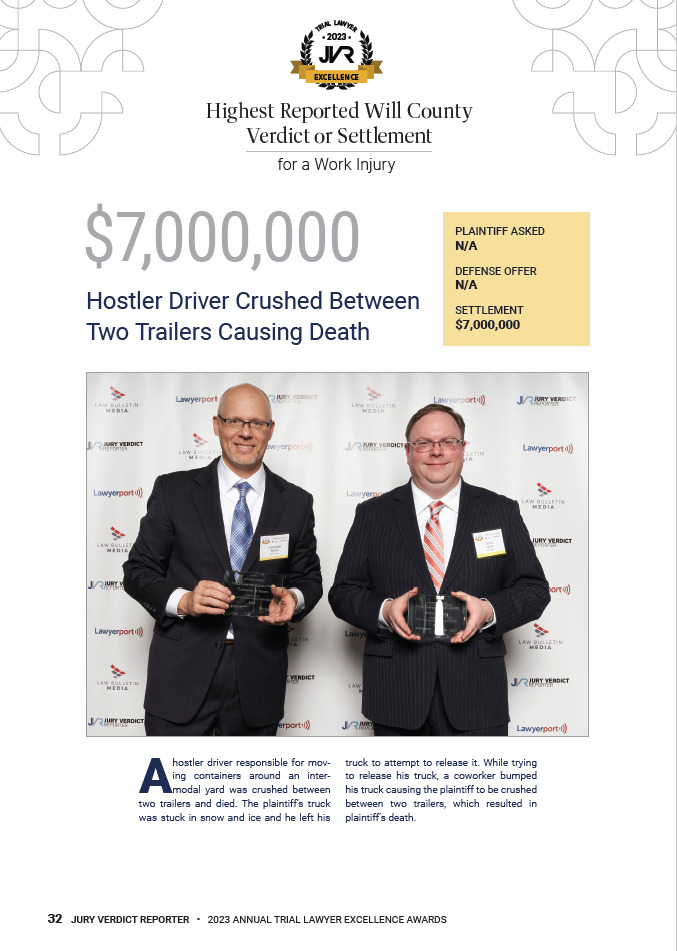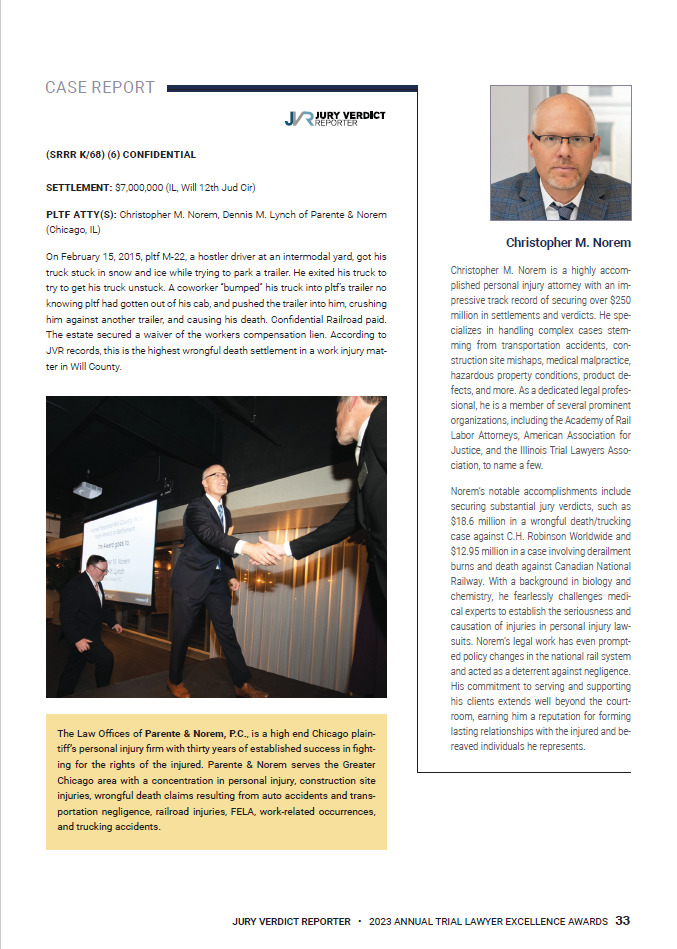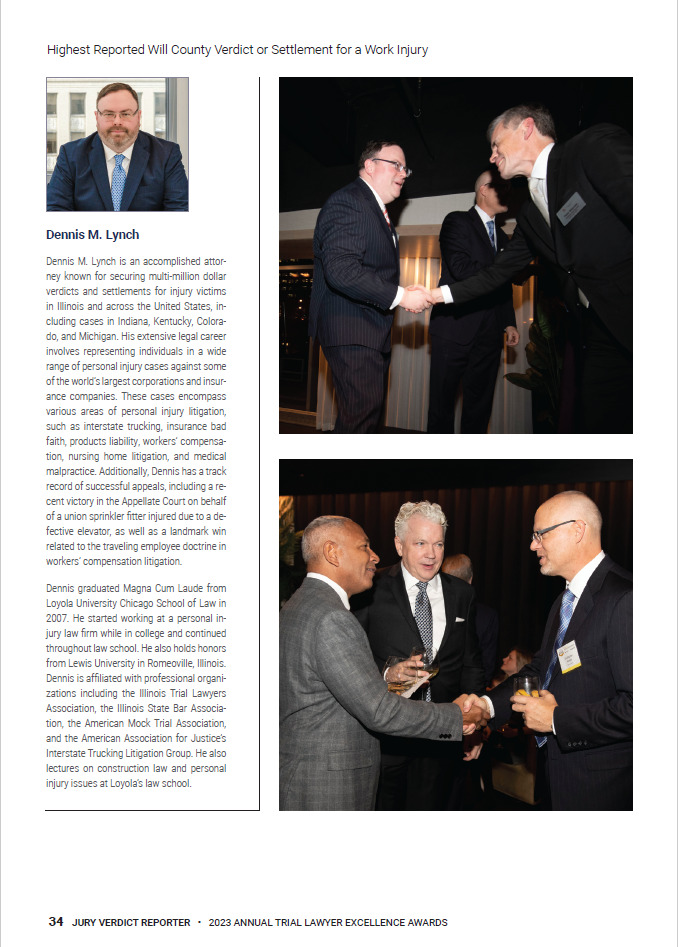
P&N BLOG | Meet Alexa Soto!
This week, The Law Offices of Parente & Norem, P.C. would like to introduce you to one of our work injury paralegals, Alexa Soto. Alexa has been with our firm since 2023, and wears many hats! So let’s take a few minutes to get to know her a little better.
What is your favorite part of working at our firm?
I love working here because of how supportive the attorneys and managers are in guiding and teaching people interested in a legal career. It’s also inspiring working with people who are dedicated to helping their clients and treat clients with compassion and understanding.
What’s one thing people don’t know about you that they would be surprised to find out?
I’ve been a pescatarian for 6 years but I took a brief break from it recently until I decided to go back. The only reason I haven’t given up fish is because I love sushi too much. I also dabble in artistic hobbies, I like to bake, paint and embroider, mainly as a creative outlet but I also love seeing a project come to life.
What’s one thing that surprised you about your current role?
There are many opportunities to take on new projects and learn new things!
What do you think makes our team culture unique?
I would say what makes this team unique is how friendly, respectful and encouraging we are of one another. Everyone is also very hardworking and always willing to help each other out.
Lastly, if you could give one piece of advice to aspiring lawyers or those considering a career in the legal field, what would it be?
Explore different areas of the law, you might end up discovering a new found passion.
When Alexa isn’t being a rockstar here in the office, she enjoys spending her time writing yelp reviews.
Thanks for taking the time to let us get to know you, Alexa! We couldn’t do what we do without you!

$13,000,000 Settlement after Wall Falls on Carpenter’s Helper
The Law Offices of Parente & Norem, P.C. settled a Cook County construction case for $13,000,000 shortly before trial.
On July 12, 2018, a carpenter’s helper, then 30 years old, was working for a rough carpentry crew, BXH Construction, performing work on a townhome project in Countryside, Illinois. The coworkers were raising and putting in place a 40-foot-long party wall which had been pre-sheeted with drywall. While they were moving the wall into place with a sledgehammer, it fell over, landing on top of him as he was working on the other side of the wall. He sustained an L2 burst fracture and underwent emergency fusion surgery from T12 to L3 at Loyola Hospital. He was initially confined to a wheelchair and suffered from bowel and bladder dysfunction. After several years of rehabilitation, he is able to walk long distances with ankle braces and a cane.
Parente & Norem sued the general contractor, CCH, and the project owner, HPVG. Discovery revealed that no one at BXH had any OSHA training, and CCH’s superintendent admitted he was not an OSHA competent person. It was argued that although HPVG knew that CCH was not fulfilling its contractual obligations of providing daily site supervision and accident prevention, it did nothing to enforce its contract. HPVG maintained that it did nothing wrong and was not contractually obligated to police safety, claiming that CCH was an experienced general contractor and it could and did rely on them.
Although no one was present from CCH or HPVG at the time of the injury, it was argued that BXH had followed the same faulty bracing and movement procedures multiple times before the incident. The Defendants contended there was nothing wrong with the bracing procedure and this was a fluke occurrence that could not have been foreseen. All witnesses agreed that he did nothing wrong.
The case was set to proceed to trial on April 10, 2024.
The settlement included an assignment of CCH and HPVG’s contribution claims against BXH. Plaintiff now intends to try the contribution case on April 10, 2024 against his employer, BXH, to eliminate the approximately $1.5 million workers’ compensation lien.
The case was mediated by retired Judge William Gomolinski.
The plaintiff was represented by Dennis M. Lynch, Joseph D. Parente, and Christopher M. Norem of Parente & Norem.
CCH was represented by Michael Carter of Lewis Brisbois
HPVG was represented by Dan Boho of Hinshaw and Culbertson, Susan Chae Corcoran of Leahy Eisenberg and Andrew Elbogen of Kopka Pinkus.
BXH was represented by Kasia Nowak of Foley and Mansfield.
If you or someone you know has been injured due to negligence, call/text The Law Offices of Parente and Norem, P.C. at 312.641.5926 or fill out a contact form here on the website.

P&N BLOG | Meet Columba Valentin!
At The Law Offices of Parente & Norem, P.C., we believe in adding a dash of humor and a pinch of personality to our work day. Today, we have the pleasure of interviewing the first person you talk to when you call us or visit our office, Columba Valentin. Columba’s been with the firm since 2023, and there’s a really good chance you’ve talked to her if you’ve ever worked with us. So let’s get to know Columba!
If you were to describe your time at Parente & Norem in a single sentence, what would it be?
Columba: The best law firm with the most friendly and professional staff that I have ever worked for.
You are famous for your seasonal flair at your desk. What is your favorite season? Do you have any other creative interests outside of the office?
Columba: Christmas of course!!! I have a passion for interior design.
What’s something surprising people may not know about you?
Columba: When not in the office, I’m at home working on DIY projects with my husband. I absolutely love home projects. Also, I had started traveling to different states, but unfortunately COVID and the loss of my father put a temporary stop to it but will be picking up again this year, God willing.
Can you share a story where you had to go above and beyond the call of duty to assist a client, and how you managed to save the day with your quick thinking?
Columba: At my last employment, a Spanish speaking client had arrived at the wrong office for a deposition (my downtown office) when he was supposed to show up at the Beverly Office and had no translator and no way of logging in. I was alone in the office so I set up my laptop and sat with him for a few hours to translate. Everything turned out perfect!!!
Lastly, if you could give one piece of advice to aspiring lawyers or those considering a career in the legal field, what would it be?
Columba: Treat your clients like a good friend or relative. They come to us for help when they have nowhere else to turn.
When Columba isn’t being a rockstar here in the office she enjoys spending her time dining at new restaurants and giving out reviews. She’s even been told she should start a blog!
Thanks to Columba for taking the time out of her busy schedule to get to know more about her! She is such a wonderful and valued member of the P&N team!
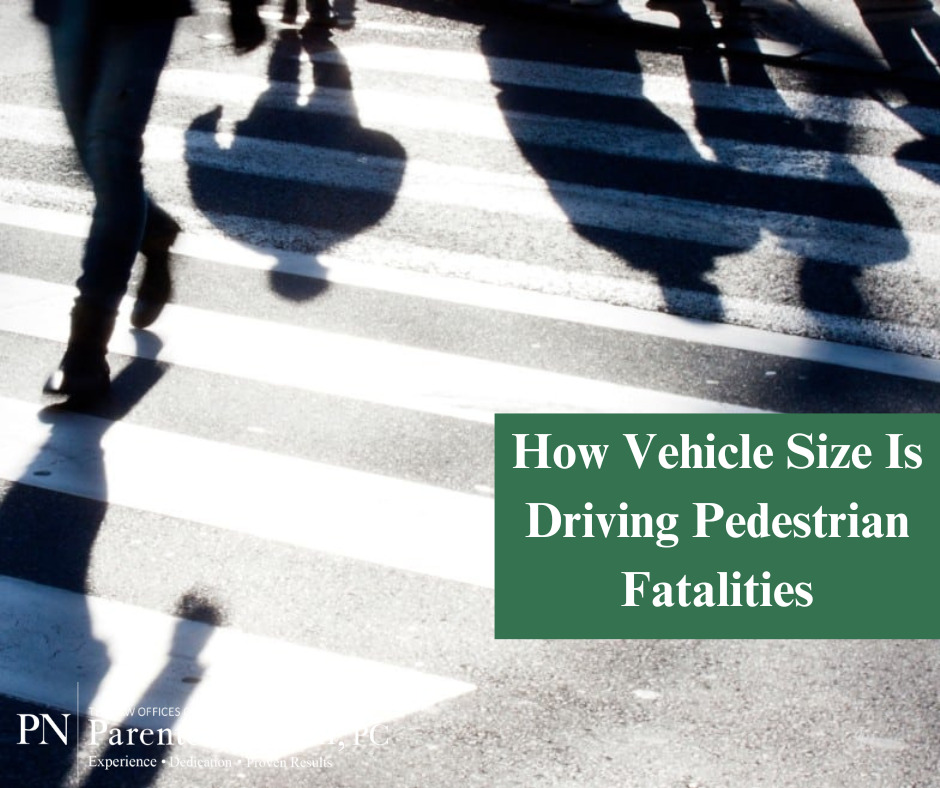
P&N BLOG | How Vehicle Size Is Driving Pedestrian Fatalities
In recent years, there has been a sharp increase in pedestrian fatalities resulting from vehicle crashes in the United States. From 2010 to 2021, the annual number of pedestrian deaths jumped by a staggering 72%, reaching 7,400 fatalities per year. This surge in pedestrian deaths contrasts sharply with the declining trend in motorist fatalities during the same period.
One significant factor contributing to this alarming rise in pedestrian deaths is the growing popularity of larger vehicles, particularly light trucks such as SUVs, pickups, and vans. These vehicles, accounting for 78% of new passenger vehicles sold or leased in 2021, pose a heightened risk to pedestrians due to their larger size, higher front-end designs, greater crash impact force, and larger blind spots for drivers.
Recent empirical research examines the relationship between vehicle size and pedestrian outcomes, shedding light on the critical role of front-end vehicle height. By analyzing national crash data encompassing 3,400 pedestrian-involved collisions, researchers have found that larger vehicles are significantly more likely to result in pedestrian fatalities, even after controlling for various crash scenarios. Specifically, a 10 cm (approx 4 inches) increase in front-end vehicle height raises the risk of pedestrian death by a substantial 22%.
While previous studies have examined the impact of vehicle size on road safety, focusing primarily on motorist safety, recent research highlights the disproportionate burden borne by pedestrians, particularly women, children, the elderly, and racial minorities. Low-income and minority populations, in particular, face a heightened risk of pedestrian fatalities due to their greater exposure to high-risk vehicle traffic.
Moreover, the shift towards electric vehicles, projected to increase vehicle weight, raises concerns about further exacerbating pedestrian fatalities. However, research suggests that regulating body design, particularly front-end height, may hold greater promise for mitigating pedestrian risks than focusing solely on vehicle weight.
As larger vehicles continue to dominate the market and replace older, smaller vehicles, the average size of vehicles on US roads is expected to increase further. Without regulatory interventions to address vehicle design standards, pedestrian fatality rates are likely to continue rising, disproportionately affecting vulnerable populations.
The sharp increase in pedestrian fatalities amidst the growing popularity of larger vehicles underscores the urgent need for comprehensive measures to enhance pedestrian safety. From regulating vehicle design standards to addressing disparities in risk exposure among various demographic groups, concerted efforts are essential to curb the devastating toll of pedestrian deaths on American roads.
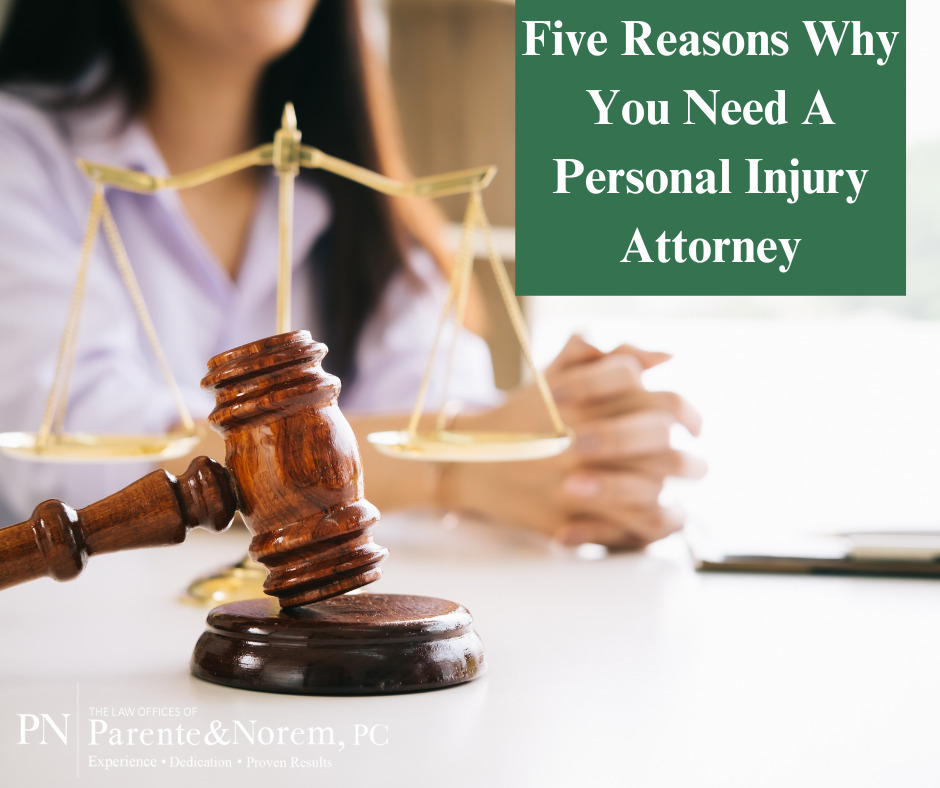
P&N BLOG | Five Reasons Why You Need A Personal Injury Attorney
When you’re injured, it can be challenging to assess whether hiring a personal injury attorney is necessary. Initially, you might trust insurance companies to act in your best interest or underestimate the long-term impact of your injuries. However, at the Law Offices of Parente & Norem, P.C., our seasoned trial attorneys advocate for your rights and entitlement to compensation. Here are five compelling reasons why seeking legal representation after an injury is crucial:
Insurance Companies Prioritize Profit Over Your Well-being: Despite operating within legal boundaries, insurance companies prioritize profits. Their teams of lawyers aim to minimize settlements. With a personal injury attorney, you level the playing field and ensure dedicated representation for your rights.
Injuries Can Have Unforeseen Consequences: The full extent of your injuries might not be immediately apparent. You deserve compensation not just for current damages but also for potential future impacts, such as pain and suffering or loss of consortium. Our attorneys specialize in assessing these damages to secure appropriate relief.
We Focus on Your Recovery: From the moment you seek medical attention to negotiating fair compensation, our priority is your recovery. If necessary, we proceed to trial to ensure your best interests are served.
Complexities in Determining Liability: In some cases, liability for injuries isn’t clear-cut. Building a strong case requires gathering substantial evidence, including police reports, medical records, and eyewitness testimony. Our experienced attorneys excel in this aspect, ensuring your innocence is proven and negligence is attributed to the responsible party.
Legal Proceedings are Time-Consuming: Pursuing a personal injury claim involves extensive paperwork, negotiations, and legal proceedings. By entrusting these tasks to professionals, you free up time to focus on your recovery and daily life.
The expertise of a personal injury attorney significantly enhances your chances of receiving fair compensation. At the Law Offices of Parente & Norem, P.C., we’re committed to guiding you through the legal process and securing the justice you deserve. Contact us today for a free case evaluation at 312.641.5926, and let us start you on your path to justice.

P&N BLOG | Nursing Home Abuse & Neglect
Nursing home abuse and neglect is an issue affecting numerous families annually. According to the National Council on Aging (NCOA), up to 5,000,000 individuals fall victim to elder abuse each year. This is why it is crucial to understand the intricacies surrounding nursing home abuse and neglect. At The Law Offices of Parente & Norem, P.C., our experienced trial attorneys specialize in assisting individuals seeking justice for their loved ones who may have suffered from nursing home abuse or neglect.
Distinguishing Abuse from Neglect in a Nursing Home Setting
A frequent misconception regarding nursing home abuse and neglect is the notion that abuse solely encompasses physical harm occurring within long-term care facilities. Contrary to this belief, neglect constitutes a form of abuse as well. Even instances of inadvertent neglect can be abusive, with the absence of malicious intent failing to absolve the facility and its staff from liability. Accidents such as administering incorrect medication dosages or providing the wrong medication by mistake can yield severe, life-altering consequences.
Neglect extends beyond these scenarios to encompass staffing deficiencies, inadequate training, and the failure of facilities to conduct thorough employee screenings and background checks. Furthermore, neglect encompasses the failure to promptly report injuries, illnesses, or incidents to family members or guardians. Other manifestations of neglect span medical, social, and emotional neglect, as well as the refusal of fundamental living necessities and neglect of personal hygiene.
Abuse transcends physical injury alone, encompassing emotional, sexual, and financial maltreatment as well.
Identifying Signs of Nursing Home Abuse and Neglect
Detecting instances of nursing home abuse and neglect can prove challenging, but several common warning signs and symptoms merit attention. These include:
– Abrupt onset of aggression, anxiety, agitation, or significant shifts in personality
– Manifestations of physical harm such as bedsores, fractures, bruises, and burns
– Indicators of malnutrition, dehydration, or sudden alterations in appetite
– Emergence of untreated or newly diagnosed medical conditions
– Disturbances in sleeping patterns or instances of insomnia
– Observations of poor personal hygiene
– Unexplained injuries, illnesses, or behaviors
Supporting Your Loved One
Documenting any alterations, incidents, injuries, or communications with the facility’s staff is paramount. Subsequently, seeking assistance from a seasoned nursing home abuse and neglect attorney is imperative. Contact us at 312.641.5926 for a complimentary case evaluation and your loved one’s path to justice begins with The Law Offices of Parente & Norem, P.C.

P&N BLOG | IDOT Reports Rise in Deadly Traffic Crashes
In a concerning trend revealed by the Illinois Department of Transportation’s preliminary data, deadly traffic crashes increased by 2.5% in 2023.
The data provided by IDOT paints a stark picture: there were 1,176 fatal collisions in 2023 – 29 more than the previous year. This alarming increase in vehicular accidents, as noted by DePaul University transportation professor Joseph Schwieterman, contrasts with the declining rates of fatalities in other sectors such as airline, factory, and warehouse accidents.
Specifically, fatal pedestrian crashes increased from 195 in 2022 to 204 in 2023, while incidents involving cyclists spiked by 42, rising from 33 in 2022. Across the state, the overall number of people killed in vehicle crashes climbed to 1,275 in 2023, up from 1,268 in 2022. In the metro region, while traffic deaths decreased in McHenry and Will counties, they rose in Cook, DuPage, Kane, and Lake counties.
With such a concerning surge in traffic-related fatalities, it becomes crucial to understand the legal implications surrounding these incidents. Victims and their families may find themselves facing complex legal challenges in seeking justice and compensation for their losses. A skilled and experienced legal team, like the trial attorneys at The Law Offices of Parente & Norem, P.C. can navigate the intricacies of personal injury and wrongful death claims arising from these tragic events.
It is essential for victims to be aware of their rights and legal options in the aftermath of a traffic accident. Consulting with our knowledgeable attorneys can help assess the circumstances surrounding the incident, identify liable parties, and pursue the appropriate legal recourse.
To effectively address the rising tide of deadly traffic crashes, it is essential to identify the contributing factors. Distracted driving, impaired driving, inadequate road infrastructure, and a lack of pedestrian and cyclist safety measures are among the key elements that demand attention.
Legal professionals specializing in personal injury and wrongful death cases related to traffic accidents can play a pivotal role in holding negligent parties accountable. By thoroughly investigating the circumstances surrounding each incident, they can build a robust case aimed at securing justice for the victims and their families.
As the numbers of fatal collisions on Illinois roadways continue to rise, it is important for individuals to be aware of their rights and seek legal assistance when needed. A compassionate and knowledgeable legal team can provide invaluable support to those affected by these tragic events, guiding them through the complexities of the legal system and working towards a fair resolution.
If you or a loved one has been impacted by a traffic-related incident, The Law Offices of Parente & Norem, P.C. is here to help. Contact us today at 312.641.5926 for a free consultation to understand your legal options and take the first steps toward seeking justice.
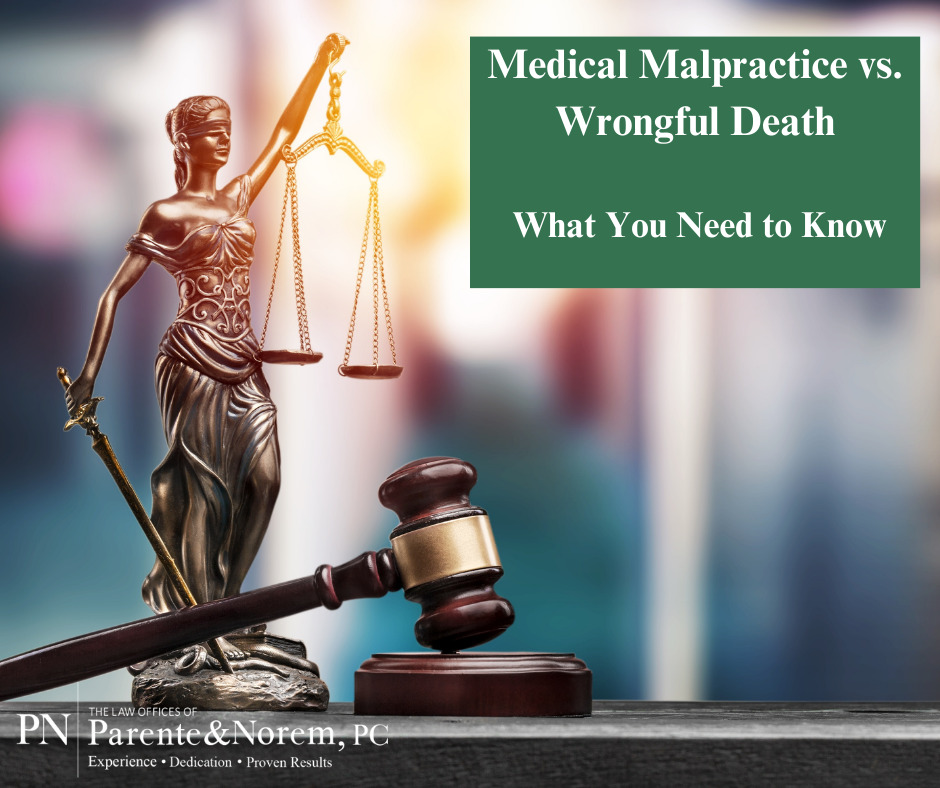
P&N BLOG | Medical Malpractice vs. Wrongful Death – What You Need to Know
Have you ever wondered about the terms ‘medical malpractice’ and ‘wrongful death’? They often surface in legal discussions or news reports, but what exactly do they entail? Are they distinct from one another, or do they intersect in certain situations? And most importantly, where does one turn for answers and guidance?
Well, let’s dive in and unravel these legal complexities together.
Medical Malpractice
Let’s talk about medical malpractice, sometimes interchangeably referred to as ‘medical negligence.’ Picture this: you’re seeking healthcare, placing your trust in the hands of professionals. But what happens when those professionals deviate from the standard of care, leading to harm? That’s medical malpractice in action.
Whether it’s an erroneous diagnosis, a botched surgical procedure, or a prescription error, medical malpractice can rear its head at any stage of your treatment journey. Shockingly, it stands as the third leading cause of death in the United States, trailing only behind heart disease and cancer. That’s a sobering statistic that underscores the gravity of this issue.
And here’s a crucial point to note: medical malpractice isn’t confined solely to personal injury. Tragically, it can escalate to a wrongful death claim if the negligence directly contributes to the patient’s demise.
Wrongful Death – Beyond Medical Malpractice
Now, let’s widen the lens and explore wrongful death. Unlike medical malpractice, which revolves around negligence within the realm of healthcare, wrongful death casts a broader net under the law.
Imagine a scenario where someone’s actions or a defective product leads to the untimely passing of another individual. That’s where wrongful death steps in—a legal claim asserting that the actions or negligence of a party caused someone’s demise.
But here’s the kicker: wrongful death isn’t confined to medical mishaps alone. It encompasses a spectrum of unfortunate events, ranging from nursing home abuse and defective products to automobile accidents caused by negligence.
So, what sets medical malpractice and wrongful death apart? In essence, medical malpractice hinges on negligence within the healthcare domain, while wrongful death encompasses a broader array of legal claims.
However, don’t let these distinctions muddy the waters. Remember, medical malpractice can indeed lead to a wrongful death claim, blurring the lines between these two legal realms.
Feeling overwhelmed? That’s where legal experts come into play. Our seasoned attorneys at The Law Offices of Parente & Norem, P.C. can help you decipher these nuances and chart a course forward.
Taking Action
If you suspect that you or a loved one has fallen victim to medical malpractice or wrongful death, time is of the essence. There’s a ticking clock to file your case, underscoring the urgency of seeking legal recourse.
So, don’t hesitate. Reach out to our team of attorneys at The Law Offices of Parente & Norem, PC at 312.641.5926 for a free case evaluation. We’re here to navigate the complexities of the legal system, ensuring that justice prevails.
Understanding the distinctions between medical malpractice and wrongful death is pivotal in safeguarding your rights and seeking recourse in the face of adversity. Don’t let uncertainty hold you back—take the first step towards justice today.

P&N BLOG | 5 Reasons Why You Need a Personal Injury Attorney
Have you ever found yourself in a situation where you’ve been injured and wondered whether you need a personal injury attorney? It’s a common dilemma, but one that shouldn’t be taken lightly. Injuries can have long-lasting effects on your life, and navigating the complexities of insurance claims and legal proceedings alone can be overwhelming. That’s where the experienced trial attorneys at The Law Offices of Parente & Norem, P.C. come in to fight for your rights and ensure you receive the care and compensation you deserve.
Here at the Law Offices of Parente & Norem, P.C., we understand the challenges you may face after an injury, which is why we’re dedicated to advocating for you every step of the way. Here are five compelling reasons why hiring a personal injury attorney could make all the difference in your case:
- Insurance Companies Aren’t Always on Your Side: While insurance companies may seem like they have your best interests at heart, it’s important to remember that their primary goal is to minimize payouts and protect their bottom line. Without legal representation, you may find yourself at a disadvantage when negotiating with insurance adjusters. A skilled personal injury attorney will level the playing field and fight tirelessly to ensure you receive fair compensation.
- The True Extent of Your Injuries May Not Be Apparent: Even seemingly minor injuries can have long-term consequences that impact your quality of life. From medical expenses to lost wages and pain and suffering, the damages you’ve sustained deserve proper compensation. A personal injury attorney can assess the full extent of your injuries and pursue all avenues of compensation on your behalf.
- Your Recovery is Our Top Priority: At Parente & Norem, we understand that your focus should be on healing, not navigating the complexities of the legal system. From the moment you seek medical attention for your injuries, we’ll be by your side, guiding you through the recovery process and advocating for your rights.
- Liability Isn’t Always Clear-Cut: In many cases, determining liability can be a complex and contentious issue. Whether it’s a car accident or a slip and fall injury, gathering evidence to prove fault requires expertise and resources. A skilled personal injury attorney will thoroughly investigate your case, gathering evidence and building a strong legal strategy to support your claim.
- Save Time and Energy: Dealing with insurance companies, gathering evidence, and navigating legal proceedings can be time-consuming and emotionally draining. By hiring a personal injury attorney, you can focus on your recovery while we handle the intricacies of your case, saving you time and energy in the process.
The decision to hire a personal injury attorney can significantly impact the outcome of your case. From negotiating with insurance companies to building a strong legal strategy, experienced trial attorneys can provide the support and guidance you need to pursue justice. If you’ve been injured, don’t hesitate to reach out to the Law Offices of Parente & Norem for a free case evaluation call/text us today at 312.641.5926. Your path to justice begins with us.
Remember, the information provided in this article is for informational purposes only and should not be construed as legal advice. If you have specific legal questions or concerns, it’s always best to consult with a qualified attorney.
